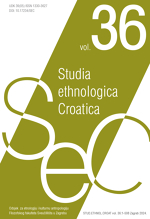Why Interactions Between Things and Subjects Matter: On the Explanatory Power of the New Material Culture Studies
Why Interactions Between Things and Subjects Matter: On the Explanatory Power of the New Material Culture Studies
Author(s): Péter BertaSubject(s): Customs / Folklore, Cultural Anthropology / Ethnology, Culture and social structure , Methodology and research technology
Published by: Sveučilište u Zagrebu, Filozofski fakultet
Keywords: new material culture studies; material agency; objectification; things-inmotion; biographical method;
Summary/Abstract: The article aims to provide an insight into the analytical approach that has emerged over the last four decades, known as new material culture studies. The first section, drawing primarily on the overviews by Miller (1994a) and Buchli (2002a), delineates the most important stages and turns of the interest of social sciences in material culture. The second section enumerates some of the distinguishing features characterizing (most of) the research projects that adopt this analytical approach, with a special focus on material agency (how do things construct subjects?), objectification, as well as the perspectives of things-in-motion and things-in-process (Domańska 2006). The third section highlights some of the main directions of the problem sensitivity that is at the heart of new material culture studies (concentrating, among other issues, on the nature of the boundary between subjects and things, the social constructions of authenticity, the politics of style, taste, and aesthetics, as well as the complex relationship between things and memory). Finally, the last section describes how the biographical method has gained such popularity in recent decades among researchers committed to this analytical approach and reveals the reasons for its explanatory power.
Journal: Studia ethnologica Croatica
- Issue Year: 2024
- Issue No: 36
- Page Range: 239-266
- Page Count: 28
- Language: English

